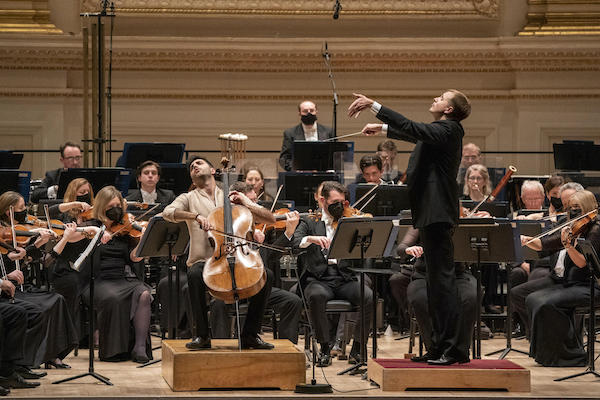After a long absence, Royal Philharmonic returns to Carnegie with energy, brilliance

Vasily Petrenko, music director of the Royal Philharmonic Orchestra, delivered some introductory remarks before the ensemble’s Monday night concert in Carnegie Hall.
A couple of the things he said were surprising. One is that the orchestra had managed to pull of a complete American tour, from West to East Coast, no small feat in the winter of 2022. Even more surprising is that this was the first Carnegie appearance for the orchestra in more than 20 years.
For a major orchestra, that’s hard to fathom. And after crowd-pleasing performances of Britten, Elgar, and Holst on Monday night, one expects a return engagement will come much sooner.
The orchestra brought some of the most colorful and beloved of English classical music, opening with Britten’s Four Sea Interludes from Peter Grimes and finishing with Holst’s The Planets. In between these, Kian Soltani appeared as the soloist for Elgar’s Cello Concerto in E Minor. This was a program to show off the sound and musicality of the orchestra, and the results were satisfying and often thrilling.
The pieces from Britten and Holst were each demonstrations of what a composer can do with orchestration, combing instrumental qualities and colors for aesthetic and expressive effect, from the complex and uncanny poignancy of the first phrase in the “Dawn” Interlude to the haunting, off-stage voices (drawn from Musica Sacra) in the Planets finale, “Neptune, the Mystic.”
The excellent players in the RPO can make all the requisite polished sounds, but what was most impressive was how the orchestra, under Petrenko, managed the blend and balances between instruments and groups. It’s one thing for a composer to score a line for high strings and flutes, quite another for an orchestra to play it in such a way that these are on the fine line of inseparability that produces a sense of marvel and wonder in the mind and heart.
That was the sound of the Sea Interludes. Each had a delicate quality and a robust foundation, so that the bustle and threat of “Sunday Morning” and “Storm” were both high energy and under control. This seemed to reflect Petrenko’s manner at the podium, which was always clear and often relaxed, but full of dynamism when the music called for maximum energy.
The elegiac Cello Concerto was suave and skillful. Soltani played with a singing sound, touched with a slight throatiness and a bite of grain on the edge, less tragic and dark, more yearning and keening. His intonation was perfect, his phrasing clear and expressive and unmannered.
More notable, though, was that this was a superb ensemble performance. This is not a concerto that’s packed with virtuosic cadenzas, it’s much more of a single voice with the lead, but playing with the orchestra. The balance between Soltani and the ensemble was as fine as one has ever heard in this piece, the soloist always coming through, even when he and the orchestra shared the same line.
This was technically skillful but also served the music well, pushing the beauty and the expression to the front, rather than merely highlighting Soltani. One heard more cumulative tension and formal satisfaction in the overall piece.
Soltani’s encore was also an ensemble performance. He played his own arrangement for cello ensemble of the Introduction to the Shostakovich’s score for The Gadfly, Soltani sharing the lead, and playing with rhythmic and harmonic accompaniment.
The Planets is one of the most famous and popular works in the classical repertoire, which may be the reason for the paradox that it is relatively infrequently performed in concert. That’s a shame, because it’s one of those works that its renown obscures the fact that it is a genuine masterpiece. In one sense, it’s one of the great concertos for orchestra, displaying so many possibilities.
In another, it’s a tour-de-force of imagination and craft. Representing places and mental images in music is a tremendous challenge, like telling another person one’s dream and having them feel it the same way.
Holst manages that, while also covering vast moods. “Mars” is beyond famous, and the performance was energetic enough to produce a couple messy entrances. But movements like “Mercury” and “Jupiter” were just as energetic, and the slow, stately melody in the latter was gorgeous and stirring. One relished each coming movement, eager to hear the strength and sensitivity of the orchestra’s playing. This was a brilliant performance.
With something still in reserve, the RPO dashed off the “Dance of the Tumblers,” from Tchaikovsky’s The Snow Maiden as an encore. The audience, which had already been applauding between movements in The Planets, had one last ovation in them. The beaming orchestra members looked like they could have played all night.
The Philadelphia Orchestra, soprano Angel Blue, and conductor Yannick Nézet-Séguin, play music from Matthew Aucoin, Valerie Coleman, Samuel Barber, and Florence Price, 8 p.m., February 8. carnegiehall.org